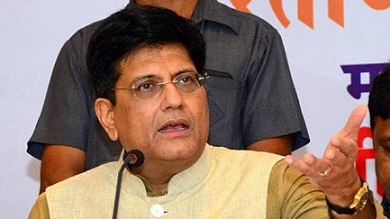By Our Correspondent
NEW DELHI: The Union Minister of Commerce and Industry and Railways, Piyush Goyal, in a written reply in the Lok Sabha has said that the Central Government is working on setting up a Single Window System for clearances and approvals of industry in the country. Despite the presence of several IT platforms for investing in India such as in departments of the Government of India and State Single Window Clearances, investors need to visit multiple platforms to gather information and obtain clearances from different stakeholders.
To address this, the creation of a centralized Investment Clearance Cell which would provide end-to-end facilitation support, including pre-investment advisory, information related to land banks; and facilitating clearances at Central and State level was proposed and the same is also a Budget Announcement 2020-21.
The cell is being planned as a One-stop digital platform to obtain all requisite central and state clearances/approvals required to start business operations in India. The Investment Clearance Cell will be a National portal that integrates the existing clearance systems of the various Ministries/ Departments of Govt. of India and of State Governments without disruption to the existing IT portals of Ministries and will have a single, unified application form. This will eliminate the need for investors to visit multiple platforms/ offices to gather information and obtain clearances from different stakeholders and provide time-bound approvals and real time status update to investors.
All the concerned State Governments including Tamil Nadu and Central Ministries/Departments are being taken on board for the Single Window Clearance System.Further, a GIS enabled land bank under Industrial Information System (IIS) is being developed, and it has been launched in a phased manner by the Department on 27th August, 2020 with integration of 6 States Haryana, Uttar Pradesh, Telangana, Gujarat, Odisha and Goa; other concerned states are being on boarded.
With the objective of facilitating investment, fostering innovation, building best in class manufacturing infrastructure, making it easy to do business and enhancing skill development, the Government is focusing on 27 sectors under Make in India 2.0. Department for Promotion of Industry and Internal Trade is coordinating action plans for 15 manufacturing sectors, while Department of Commerce is coordinating 12 service sectors.
The Government is in the process of bringing out a strategy paper on boosting industrial growth which will be a roadmap for all businesses in the country. Scheme for Affordable Rental Housing Complexes (ARHCs), a sub-scheme under Pradhan MantriAwasYojana – Urabn (PMAY-U), for providing accommodation at affordable rent to urban migrants / poor has been launched on 31.07.2020 after approval of the Union Cabinet. It’soperational guidelines along with implementation framework have been circulated to all States/Union Territories (UTs) for planning and implementation. A draft Memorandum of Agreement (MoA) has been circulated to all States/UTs to sign with Ministry of Housing and Urban Affairs (MoUHA). Till date 17 States/UTs have signed the MoA with MoHUA to implement the Scheme.
As per the Scheme Guidelines of ARHCs, mapping and identification of beneficiaries is the responsibility of selected Concessionaires/ Entities. Concessionaires/ Entities may tie up with local industries/ manufacturers / service providers / educational / health institutions / market associations / others employing urban migrants / poor to provide accommodation in-block and remit rental by deducting directly from their salary / fees / any kind of remuneration, as feasible. The States / UTs / ULBs / Parastatals will facilitate tie up between Entity and Public / Private bodies for migrants in factories, industries / institutions requiring rental accommodation for ensuring occupation and continued revenue.
Government, inter alia, has taken a number of measures to increaseproductivity and quality including launching of Product Linked Incentive Scheme and Phased Manufacturing Programme for a number of sectors and issuing Quality Control Orders for a number of products. Efforts are on to improve the multi-modal logistic infrastructure in the country. Digitization is also being embraced by industry leading to increase in productivity and quality.
Government, inter alia, is in the process of rationalizing the existing central labour laws into 4 Labour Codes i.e. the Code on Wages; the Code on Industrial Relations, the Code on Occupational Safety, Health & Working Conditions & the Code on Social Security by simplifying, amalgamating and rationalizing the relevant provisions of the existing Central Labour Laws. Code on Wages has been approved and notified.



























